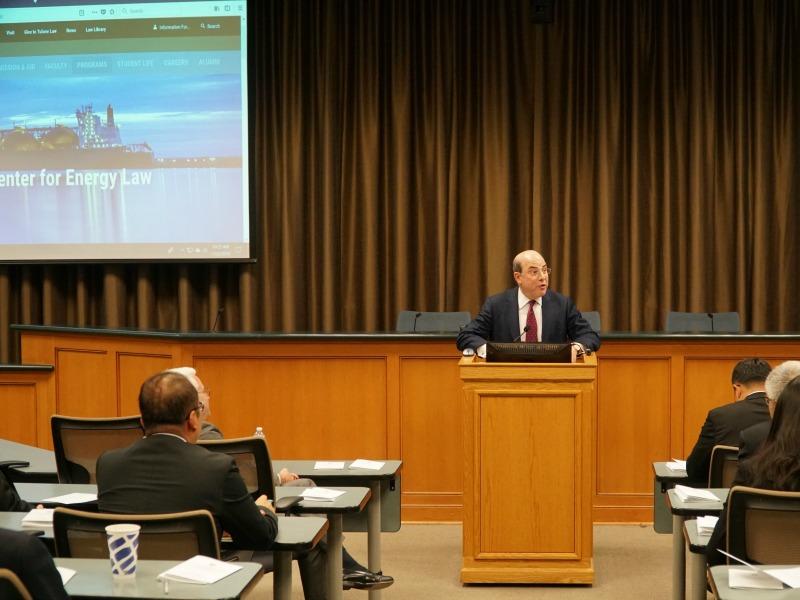U.S.-China Energy Forum: Tariffs Hurting Industry
The escalating trade tensions between the U.S. and China could provide challenges to the energy industry in the long-term, according to a number of international energy leaders who attended the 3rd annual U.S.-China Energy and Trade Law Forum hosted by Tulane Law School's Center for Energy Law and the Tulane Energy Institute.
“We continue to emphasize the importance of free trade policies to the global market,” said Randall Ebner (L’80), vice president and general counsel of Exxon Mobil. “Tariff wars hurt everyone – there is no winning.”
Ebner was the keynote speaker of the conference, which drew global experts from industry, government, academia, and the legal and business communities to discuss some of the most pressing challenges and opportunities of our time.
Ebner spoke about the challenges facing the energy industry, including balancing growing global demand for reliable and affordable sources of energy while also protecting the environment. Technology has enabled oil and gas industries to innovate and reach new sources of energy, even as the marketplace faces uncertainty.
“We know from history that transformation has always been a part of the energy business,” Ebner said.
He said fossil fuels are not on the way out, even as companies balance the affordable energy equation with reducing the environmental impacts associated with climate change. In fact, those forms of energy will continue to play a significant role as world energy demand grows 25 percent by 2040, Ebner said.
Finally, Ebner touted Tulane Law School’s newly-created Center for Energy Law as an important new resource for industry, policymakers, and other stakeholders seeking to forge greater understanding and consensus in energy policy.
Ebner, who launched his career as a lawyer with Exxon directly after his 1980 graduation from Tulane Law School, emphasized the importance of preparing the next generation of independent, highly-trained and qualified lawyers and judges who will shape the future of energy law and policy.
“Lawyers have always had a seat at the table in energy, and are conducting meaningful work in energy law,” he said, adding that the benchmark should be to live by the rules of law, practice the highest level of compliance and to have the confidence to do both well.
Dan Eberhart (L ’05), chief executive officer of Canary, LLC, an oilfield services company based in Denver, mirrored some of Ebner’s views on the trade war between the U.S. and China, saying it’s hurt his company, particularly with the rising cost of steel. The tariffs on China have been a wet blanket on the energy business and growth, and they’ve had a negative impact on everything from manufacturing, jobs and shipping.
Neither country needs the other, he said, in a fungible market like energy.
“But both countries would benefit immensely from ending the current trade war and not allowing it to escalate any further,” he said. “The economic, geopolitical and strategic advantages of continuing free and fair trade are evident for both countries.”
Eberhart, whose company runs four factories in China manufacturing energy-related products, said that uncertainty over the U.S.-China trade relationship is causing industry to take a wait-and-see attitude toward new business investments. He added that perhaps the largest economic impact of the current tariff wars will become clear only in the years to come, as a result of new business opportunities forgone during this period of uncertainty.
Others attending and speaking at the conference included:
- Penelope Crossley, Senior Lecturer, Centre for Asia Pacific Law, University of Sydney;
- Pan Jiang, First Secretary for Chinese Embassy, Washington
- Anton Ming-Zhi Gao, Associate Professor, Institute of Law for Science and Technology, National Tsing Hua University, Taiwan
- Robert Sloan, Senior Research Fellow, Tulane Center for Energy Law
- Eric Smith, Professor and Director of the Tulane Energy Institute, A.B. Freeman School of Business, Tulane University
- Kim Talus, James McCulloch Chair in Energy Law and Director of Tulane Center for Energy Law
- Guiguo Wang, Eason-Weinmann Chair of International and Comparative Law, Tulane Law School
- Barry Worthington, Executive Director, United States Energy Association

